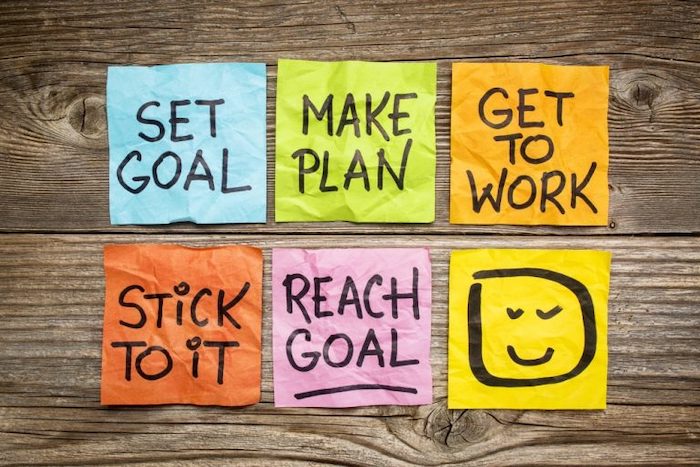Mental health goal setting

Mental health goal setting
Over the years I have learnt that motivation is something we can kickstart at any point of the year. I learnt not to wait until the next month or the next week to start working on my goals. Along the way, I picked up a few tricks on how to set my goals and to stay consistent to achieve them.
Know your goal
Firstly, we really need to know what we are working towards – we need to clarify our goal. Unless we know what exactly we want to achieve, we won’t achieve it. For example, ‘I want to have a happy life’ – this is a very vague wish. We need to understand what that ‘happy life’ looks like – what does it include?
Everyone’s ‘happy’ is different – it means different things, involves different people. As individuals, we need to be very specific about what these are in order to make it happen.
- Think about what your priorities in terms of goals are; short-term and long-term. Set your own short-term and long-term timescale. Your short-term goals might be the stepping stones to your long-term goals.
- Clarify – write down all your short-term/long-term goals.
- Prioritise – put them in order of your own priority.
You should now have a clear list of your goals. The ones you want to start working on right away. And the ones you can start laying the foundations down for in the future.
Tangible and intangible goals
Are your goals measurable in terms of, say, money, kilos, or time? Perhaps you have a six-figure salary in mind. You want to lose some weight, buy a house, or go on more holidays each year.
Or are your goals non-measurable? Is it about feeling good within, building confidence and a sense of satisfaction for you? You want to feel in control of your life, manage your anxiety, or set boundaries and rebuild your resilience.
Whatever your goals are, decide on the way you are going to measure your progress – daily, weekly, monthly. Are you going to measure it in numbers, or the way you feel, think or behave?
Set realistic goals
Setting yourself realistic goals is the key to achieving what you set to do. If you set your goals too high, you may feel disappointed if you do not perform. If you don’t perform, you might feel like a failure. It will be harder to spring back and stay consistent.
On the other hand, if you set your goals slightly lower and think realistically how all the internal (your mental state of mind, unexpected illness, loss of motivation, etc.) and external factors (family, friends, finances, unexpected events, pandemic restrictions, etc.) may affect your goal’s progress, you are more likely to succeed.

When you succeed, you will feel more confident in yourself and your abilities. You will feel powered up to start work on your next goal.
Ensure that when you look at your goals, you feel confident that you will achieve them. If you feel anxious or demotivated at this point, the universe might be telling you something – your goals are not realistic at this moment in life. Review and refine your goals.
Split your goals into sub-goals
Thinking of your final goal may feel too overwhelming. You can’t imagine how you could get from A (where you are now) to B (where you want to be).
- Break your goal into sub-goals (stages). This way you are splitting one huge chunk into a few smaller, digestible pieces (steps) to work on.
- Put them in order and work through each of them, one at the time. Focus on and complete each step before moving to the next.
- Review and adjust your steps as you go along. Circumstances may change. Stay open to alternatives.
3-5 daily wins
We all have things to do on daily basis. Many of us write a ‘to-do list’ for each day. We might have one for work, one for leisure or home. One important thing to keep in mind is to stick with 3-5 wins a day. Any more than 5 wins might make you feel ‘overloaded’ and increase your ‘anxiety’ throughout the day.
For example, a working day might look like this:
- Work
- Food shop
- Gym
A weekend day might look slightly different:
- Walk
- Lunch with friends
- Drink enough water
- Read a book
I would normally make my 3-5 ‘mini wins’ list the night before or in the morning. I make sure that I consider my energy levels on that day, what is urgent and what can wait and how much time each task takes to stay realistic about achieving my mini goals.
Leave some space for emergencies. Reshuffle slightly if needed. Give yourself options. Don’t beat yourself up about things if you don’t complete all mini goals for that day. Things that are out of your control do happen.
Focus on what you can control (=reshuffle your mini wins, shift one or two on a different day), NOT what you can’t control (= trying to complete all of your goals whilst picking up and looking after your poorly child all afternoon).
Goal tips for each aspect of life
The goal setting tips I have described above can be implemented to achieve goals in all aspects of life. The recipe is simple, yet hugely effective.
Whether your goal is to work on your mental health, tackle your deepest fears, become more active for your physical health or to earn 20K a month, these tips apply.
If you are interested in working on your mental health goals and don’t know where to start, allow me to be your guide. As a qualified, BACP registered person-centred counsellor I offer a safe and non-judgemental space where you can talk in confidence. Get in touch for a FREE initial chat to discuss your needs and we will take it from there.
My face-to-face counselling sessions are available in Manchester. Video-call sessions can be accessed from anywhere in the UK. Email enquiries@simplytalkcounselling.co.uk or get in touch and follow me on Facebook or Instagram.






